One thousand-millionth of a metre. Or, to put it differently: one billionth of a metre. This unfathomably small number is called a nanometre and the world of nanotechnology operates at between 1 and 100 nanometres. This is also where the North-West University (NWU) is unearthing new ways to combat disease, to help protect the environment and to develop materials that will promote sustainability.
The focus area Material Science Innovation and Modelling (MaSIM) at the NWU has endeavoured to become a leading research and development centre in the area of materials, metal initiatives and nanotechnology initiatives to solve industry-related problems on a regional, provincial and national level. In addition, research at the NWU investigating solutions to long-term food security questions extensively incorporates the use of nanotechnology, such as the development of less toxic agricultural inputs, which include fertilisation approaches. But that is hardly where the NWU’s exploits into the field of nanotechnology stop.
Professor Omolola Fayemi and her team from the School of Physical and Chemical Sciences at the Faculty of Natural and Agricultural Sciences are focused on nano sensors. Here, they fabricate electrochemical-based sensors with different nanocomposites such as green-based synthetics, chemical-based synthetics and electrospun nanofibres to sense biological molecules such as environmental pollutants, adulterants in food and contaminants in waste water.
“Basically,” says Fayemi, “we are dealing with nanomaterial for sensing applications.”
The applications of nanotechnology are nigh on endless.
“When you look at neurotransmitters like dopamine and serotonin in the body, we can use nano sensors to detect abnormal levels of these neurotransmitters, which in turn can help us to determine the psychological well-being of a person.” Nanotechnology also has huge implications for illnesses such as Parkinson’s disease and cancer.
“We can also use nano sensors to pre-emptively warn people not to use water that has been adversely affected by pollutants such as industrial waste. The same applies to food, which is sometimes laced with adulterants that can be detrimental to your health. Too many food suppliers are neglecting to uphold the requisite standards and nano sensors can help detect this,” says Fayemi, who was born and raised in Lagos, Nigeria, roughly 6 487,5 km from her office at the NWU’s campus in Mahikeng. Incidentally, that translates to 6 487 000 000 000 002 nanometres.
“I am a long way from where I was born, but the NWU is my home. It is an institution that strives for excellence in all its endeavours and one that encourages academic freedom. It is also an institution that cares. We have had great outputs in the field of nanotechnology and this helps us to spread our ethic of care to our wider community, both locally and abroad. I cannot recommend the NWU highly enough, especially if you want to pursue a career in nanotechnology.”
If ever there was a slogan for the exciting uses of nanotechnology, then it is perfectly encapsulated by Fayemi when she says: “Nanotechnology might be small, but it is mighty.” Now that is no secret.

Professor Omolola Fayemi
